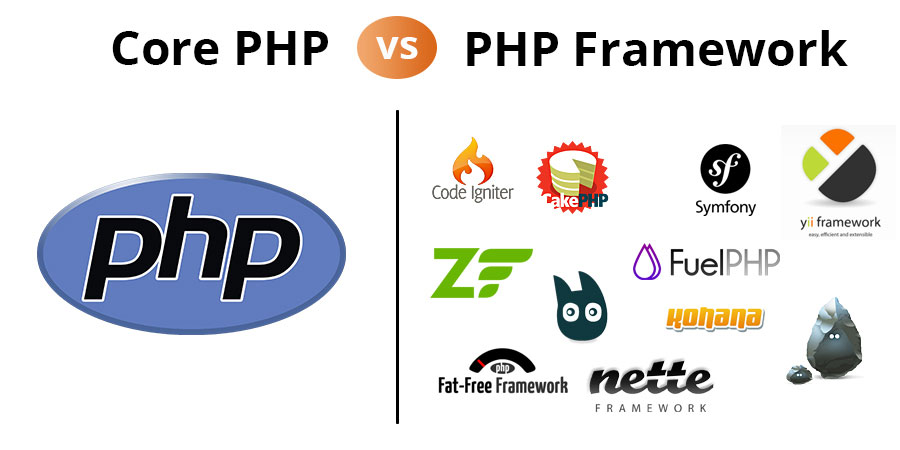Core PHP vs Frameworks: Which One Should You Choose?

When it comes to developing a website or web application, choosing the right technology is crucial. Many developers and business owners often face a dilemma between Core PHP and PHP frameworks. Both have their own advantages and limitations, making it important to understand which one suits your project needs better. In this article, we will explore the differences between Core PHP and frameworks to help you make an informed decision.
What is Core PHP?
Core PHP refers to writing PHP scripts manually without using any additional libraries or frameworks. It allows developers to create web applications from scratch, offering full control over the coding process. With Core PHP, developers have the flexibility to build customized websites and applications as per the requirements.
Advantages of Core PHP
-
Full Control Over Code: Since Core PHP involves writing code manually, developers have complete control over the structure and functionality of the application. This helps in creating highly customized websites.
-
Flexibility and Customization: Core PHP gives the freedom to create unique features without being restricted by the limitations of a framework.
-
Lightweight Applications: Applications developed using Core PHP are often lightweight, as they do not require additional libraries or files.
-
Suitable for Small Projects: For small-scale websites or projects where complex features are not required, Core PHP can be a good choice.
Disadvantages of Core PHP
-
Time-Consuming: Developing applications using Core PHP takes longer since developers need to write everything from scratch.
-
Higher Chances of Errors: Without a predefined structure, there is a higher possibility of bugs and errors if the code is not properly maintained.
-
Lack of Security Features: Security implementations have to be handled manually, making the process more complex.
Many companies offering Core PHP Development In Udaipur prefer Core PHP for projects where custom functionalities and lightweight applications are required.
What are PHP Frameworks?
PHP frameworks provide a structured environment to develop web applications using pre-defined libraries and modules. Frameworks follow the Model-View-Controller (MVC) architecture, which separates the business logic from the presentation layer. Popular PHP frameworks include Laravel, CodeIgniter, Symfony, and Yii.
Advantages of Using Frameworks
-
Faster Development Process: Frameworks provide pre-built modules, reducing the time required to develop web applications.
-
Security Features: PHP frameworks come with built-in security features that protect applications from common threats such as SQL injection and XSS attacks.
-
Better Code Organization: The MVC architecture ensures that the application is well-organized and easy to maintain.
-
Reusability of Code: Frameworks promote reusability, which helps developers avoid writing repetitive code.
-
Community Support: Most PHP frameworks have strong community support, making it easier to find solutions to common problems.
Disadvantages of Using Frameworks
-
Limited Flexibility: While frameworks offer many built-in features, they may limit the flexibility to create highly customized applications.
-
Higher Resource Consumption: Frameworks often require more server resources compared to Core PHP, which can lead to performance issues.
-
Learning Curve: For developers who are new to frameworks, understanding the structure and conventions may take time.
Several companies, including a Web Design Company In Udaipur, opt for frameworks when they need to develop large-scale web applications with faster turnaround times and better security.
Core PHP vs Frameworks: A Detailed Comparison
Ease of Development
Core PHP requires developers to manually write and manage all the code, which can be time-consuming. On the other hand, frameworks offer pre-built modules that simplify the development process and save time.
Customization and Flexibility
Core PHP provides more flexibility for developers to create custom functionalities without restrictions. Frameworks, however, come with a predefined structure that may limit flexibility but ensures a consistent development process.
Security
Security is one of the major concerns in web development. Frameworks offer built-in security features that protect against common vulnerabilities. In contrast, developers using Core PHP need to implement security measures manually, which can be challenging.
Performance
Applications built with Core PHP are often more lightweight and faster because they do not rely on additional libraries. However, well-optimized frameworks can also deliver excellent performance, especially for large-scale applications.
Scalability
Frameworks are generally more scalable than Core PHP because they follow a structured approach that makes it easier to manage and expand applications as business needs grow.
Learning Curve
Developers who are new to PHP may find Core PHP easier to learn since it involves basic coding. However, learning a framework requires understanding its conventions and architecture, which may take some time.
When Should You Choose Core PHP?
- For small projects that require minimal features and custom functionalities.
- When you want complete control over the code and design.
- If you have a team that is well-versed in writing secure and optimized PHP code.
When Should You Choose a Framework?
- For large-scale applications where security and performance are critical.
- When you need to develop applications quickly without writing everything from scratch.
- If you prefer a structured environment that ensures better maintainability and scalability.
Final Thoughts
Both Core PHP and frameworks have their own advantages and limitations. The choice between the two depends on the size and complexity of the project, along with the developer’s expertise. Businesses that require customized, lightweight applications may prefer Core PHP, while those looking for faster development with built-in security may opt for frameworks.
Udaipur Web Designer understands the importance of choosing the right technology for web development. Whether you are considering Core PHP Development In Udaipur or using a framework, it is essential to analyze your project requirements and choose the best option to achieve your goals.







